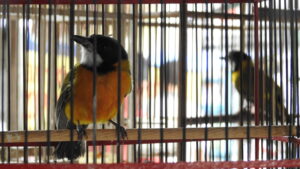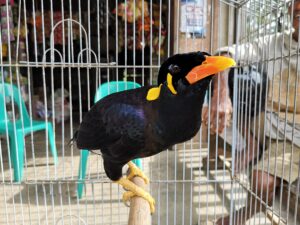Save the Date: The Global Songbird Crisis side event at CITES CoP20, Dec 2, 19:00–20:30 Location: Saker Falcon Room, Samarkand
Concerned that songbirds may loose priority in relation to CITES.

During CoP19 the CITES Decisions 18.256 to 18.259 on Songbird trade and conservation management called for a preliminary study on the scale and scope of international songbird trade, consultation with appropriate technical experts, and a technical workshop on the topic.
The technical workshop was carried out in Bangkok in 2023, with enthusiastic participation but the results clearly indicated that songbirds are under-represented* in CITES frameworks in relation to volumes of trade and levels of conservation concern for species affected by the trade. The technical workshop recommendations calls for the CITES secretariate and Parties to support and facilitate further CITES activities and potental CITES listing proposals for relevant species.
Although most recommendations has not been fully addressed and are based on preliminary studies the CITES Animals Committee calls for a deletion of the decisions with proposal CoP20 Doc. 83.
During CoP20 a single listing proposal for a songbird species has been submitted for consideration CoP20 Prop. 18. We strongly support this proposal by Brazil for the inclusion of the Great-billed Seed-finch in Annex I as well as inclusion of similar looking Chestnut-bellied Seed-Finch, Black-billed Seed-finch, Large-billed Seed-finch, Thick-billed Seed-finch and Nicaraguan Seed-finch in Annex II
We call upon Parties to consider and prioritize songbirds in CITES listings including Annex III listings for nationally protected species which regularly appear in the international trade.
Recent supportive research:
Donald, P.F. et al. (2023) ‘Assessing the global prevalence of wild birds in trade’. bioRxiv, p. 2023.08.09.552606. Available at: https://doi.org/10.1101/2023.08.09.552606.
Juergens, J. et al. (2021) ‘A standardized dataset for conservation prioritization of songbirds to support CITES’, Data in Brief, 36. Available at: https://doi.org/10.1016/j.dib.2021.107093.
Jacqueline Jürgens, Johanna Staerk, Simon Bruslund, Rikke Oegelund Nielsen, Dalia A. Conde,(2025) CITES Appendix III matters: Hidden impacts of CITES deletions on global bird trade, Biological Conservation, Volume 310, 2025, Available at: https://doi.org/10.1016/j.biocon.2025.111365.
Anna Haukka, Jacqueline Jürgens, Johanna Staerk, Aleksi Lehikoinen, Simon Bruslund, Andrea Santangeli, (2025) Aesthetic values predict bird trade, but the association varies across product types and trade regions, Biological Conservation, Volume 313, 2026, Available at: https://doi.org/10.1016/j.biocon.2025.111572.
Chris R. Shepherd, Boyd T.C. Leupen, S. Sunny Nelson, Lalita Gomez, John A. Allcock, Simon Bruslund, Caroline Dingle and Vincent Nijman (2023) Global commercialisation, under-reported trade, and the need for increased international regulation of a non-CITES listed songbird , Journal of Asian Ornithology, Vol. 39, 2023. Available at: 2023SH1.pdf
Sarah Heinrich, Boyd T.C. Leupen, Simon Bruslund, Andrew Owen, Chris R. Shepherd, (2021) A case for better international protection of the Sumatran Laughingthrush (Garrulax bicolor), Global Ecology and Conservation, Volume 25, 2021. Available at: https://doi.org/10.1016/j.gecco.2020.e01414.
* The Songbird Species Knowledge Initiative project identified a high diversity of songbird species in international trade with several being threatened with trade considered a primary driver but that only a tiny fraction of these are protected in CITES annexes. A subsequent litterature review made by BirdLife International Trade in wild birds: a global overview confirmed these findings. Based on these studies and the Bangkok Technical Workshop a preliminary priority list of songbird species was produced.

